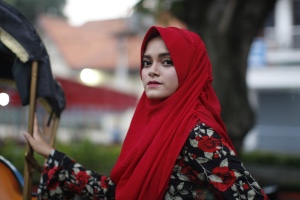
Hijab Row
 By Shankar Raj*
By Shankar Raj*
Bengaluru: The Karnataka High Court today dismissed a batch of pleas by student petitioners against the ban on wearing the hijab in classrooms in the State. Dismissing the pleas, a full bench headed by Chief Justice Ritu Raj Awasthi and comprising fellow judges Krishna S Dixit and JM Khazi said their arguments are ‘devoid of merit’ and so are not maintainable. The student petitioners will now approach the Supreme Court, challenging the verdict.
The verdict is likely to come as a big political windfall for the Bommai government as it is likely to lead to further consolidation of Hindu votes while the minority Muslim votes, which in any case never came to the Bharatiya Janata Party’s kitty, would get split between the Congress and the Janata Dal (Secular).
Also read: Karnataka court all set to deliver verdict on Hijab issue
While delivering the crucial verdict, the High Court raised and answered three broad questions on the hijab — if it is an essential religious practice; if prescribing a uniform violates fundamental rights, and whether the Karnataka government’s order on February 5, 2022, mandating a uniform is arbitrary and violates rights.
This is what the bench said:
- The court categorically said the wearing of the hijab by Muslim women does not form a part of essential religious practice in the Islamic faith. Citing the Holy Quran, the court said that it “does not mandate wearing of hijab or headgear for Muslim women” and that “there is sufficient material in the Quran to support the view that wearing hijab has been only recommendatory.”
“At the most, the practice of wearing this apparel may have something to do with culture but certainly not with religion,” the court said and added that because there is no punishment or penalty for not wearing hijab and that the apparel, at the most, is to gain access to public places and not a religious end in itself. “What is not religiously made obligatory, therefore, cannot be made a quintessential aspect of the religion through public agitations or by the passionate arguments in courts,” the High Court said.
The High Court also said that the petitioners have not placed any material on record to show that wearing hijab is an ‘act of conscience’ under Islam, to be protected under Article 25 which guarantees the right to freedom of conscience and free profession, practice and propagation of religion.
“There is no evidence that the petitioners chose to wear their headscarf as a means of conveying any thought or belief on their part or as a means of symbolic expression. Petitioners have miserably failed to meet the threshold requirement of pleadings and proof as to wearing hijab is an inviolable religious practice in Islam and much less a part of essential religious practice,” the HC said.
- Prescription of uniform is a reasonable restriction to the fundamental right
While the petitioners had submitted that their fundamental rights are being violated by the ban on the hijab, the Court pointed out that there are reasonable restrictions to fundamental rights. These restrictions, which are imposed on the grounds of public order, morality, and health, will also cover those practices that are considered essential or vital under that religion.
“Schooling is incomplete without teachers, taught and the dress code. Collectively they make a singularity. No reasonable mind can imagine a school without a uniform. The prescription of dress code for the students, that too within the four walls of the classroom as distinguished from rest of the school premises, does not offend constitutionally protected category of rights, when they are ‘religion-neutral’ and ‘universally applicable’ to all the students,” the Court said.
- On reasonable restriction, the court said that it is “too far-fetched” to hold that the school’s dress code goes against fundamental rights. Schools and colleges are ‘qualified public places,’ which predominantly impart educational instructions. In these qualified public places, individual rights which may go against general discipline and decorum take a backseat.
In ‘qualified public places,’ like schools, courts, war rooms, defence camps, etc., the freedom of individuals as of necessity is curtailed consistent with their discipline and decorum and function and purpose, the court said.
“Such ‘qualified spaces’, by their very nature, repel the assertion of individual rights to the detriment of their general discipline and decorum. Even the substantive rights themselves metamorphose into a kind of derivative rights in such places. These illustrate this: the rights of an undertrial detenue qualitatively and quantitatively are inferior to those of a free citizen. Similarly, the rights of a serving convict are inferior to those of an under-trial detenue,” the bench said.
“Though basic human rights are universal, their regulation as of necessity is also a constitutional reality. The restriction and regulation of rights be they fundamental or otherwise are a small price, which persons pay for being the members of a civilised community. There has to be a sort of balancing of competing interests i.e., the collective rights of the community at large and the individual rights of its members,” the court pointed out.
Apart from the three main points, the court also held that if the hijab is allowed to be a part of the uniform or a headscarf of the same colour of the uniform is allowed, then the school uniform will cease to be uniform.
“There shall be two categories of girl students — those who wear the uniform with hijab and those who do it without. That would establish a sense of ‘social-separateness’, which is not desirable. It also offends the feel of uniformity which the dress code is designed to bring about amongst all the students regardless of their religion & faiths,” the court said while expressing its displeasure with the petitioners’ submission that even Kendriya Vidyalayas allow the hijab along with the uniform.
“What the Kendriya Vidyalayas prescribe as uniform/dress code is left to the policy of the Central Government. Ours being a kind of Federal Structure, the Federal Units, namely the States, need not toe the line of the Centre,” the HC said.
In a big shot for the state government, the court then said that the government has the power to issue the order and that no case has been made out for its invalidation. The schools and the College Development Committees (CDCs) are also legally allowed to establish a dress code.
However, the bench acknowledged a student’s submission that the GO was ‘hastily issued’ even though a high-level committee was to decide on the issue. But the court said governments do take certain urgent decisions which may appear to be knee-jerk reactions.
On the point that exclusion of hijab can emancipate women, the court said the prescription of school dress code by excluding religious clothing like the hijab, bhagwa, or any other apparel symbolic of religion can be a step forward in the direction of emancipation and access to education for women. “It hardly needs to be stated that this does not rob off the autonomy of women or their right to education inasmuch as they can wear any apparel of their choice outside the classroom,” the bench said.
The court also said that it was “dismayed as to how all of a sudden that too in the middle of the academic term the issue of hijab is generated and blown out of proportion by the powers that be. The way hijab imbroglio unfolded gives scope for the argument that some ‘unseen hands’ are at work to engineer social unrest and disharmony.” The HC said “We expect a speedy & effective investigation into the matter and culprits being brought to book, brooking no delay,” the HC said.
Reacting to the judgement, Chief Minister Basavaraj Bommai appealed to the public to maintain peace in the state. “It is very important that peace be maintained in society. I appeal to the public, opposition leaders, to all the youth and students, we must all accept the judgment. This will help strengthen our education, and all must work to uphold it,” the CM said. He also urged students not to miss out on classes and exams due to this issue. “You must attend classes, you must attend exams, you must prioritise.” While the state unit of the BJP welcomed the verdict there were cautious reactions from the opposition.
Dr CN Ashwathnarayanan, the state Higher Education Minister, asked students to focus on their education and not get ‘distracted’ by the wearing of religious garments in classrooms.
Congress state unit president DK Shivakumar said that the implementation of the order was in the hands of the government. “My greatest concern in the hijab controversy is education, and law and order. The Karnataka High Court has given a judgement but the responsibility for education, law and order and communal harmony is still with the government of Karnataka,” he said. In a series of tweets, he also said, “I appeal to the Government of Karnataka to show mature leadership and ensure: 1) That law and order is maintained in and around schools and colleges. 2) That the education of students is not hampered, regardless of religion and gender. 3) That there is communal harmony.”
Anticipating protests after the verdict, the Karnataka government on Monday put in place prohibitory orders under Section 144 of the Code of Criminal Procedure in several parts of the state including Dakshina Kannada, Shivamogga and Hassan. Further, schools and colleges were ordered to remain shut tomorrow.
*Shankar Raj is former Editor of The New Indian Express, Karnataka and Kerala, and writes regularly on current affairs.




